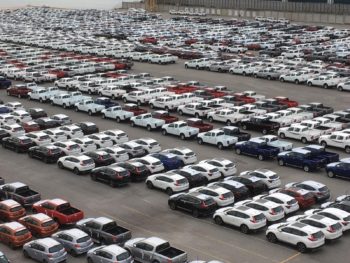UK new car registrations slump 44% in March
UK new car registrations plummeted 44.4% in March; a steeper fall than during the last financial crisis and the worst March figures since the latest nineties.

March new car registrations fell 44.4% to 254,684 units as a result of the coronavirus crisis
A total of 254,684 cars were registered in the important plate change month, equating to some 203,370 fewer cars than in March 2019 as a result of the coronavirus crisis.
However, the fall was less dramatic than in European countries that had started lockdowns earlier; Italy’s new car registrations were down 85%, France saw a 72% drop and Spain declined 69% in March.
Fleet registrations were hard-hit, falling 47.4% to 117,557 units. However, it was business registrations to sub-25 fleets that fell the most; down 61.1% to 4,846 units. Private registrations fared best but still saw a 40.4% decline to 132,281 units.
There was, however, continued uptake of ultra-low emission vehicles. Registrations of battery electric vehicles (BEVs) rose almost three-fold in the month to 11,694 units, accounting for 4.6% of the market, while plug-in hybrids (PHEVs) grew 38.0%. Uptake of hybrids, however, fell 7.1%.
As a result of the overall steep decline in March figures, year-to-date registrations were down 31.0% overall, to 483,557 units. Again, it was the Business sector hit the hardest; down 43.5% to 9,275 units. Fleet registrations fell 30.4% to 246,248 units, with private registrations declining slightly more, at 31.0%, to 228,034 units.
In line with the fall in March, the SMMT downgraded its interim market outlook for the year to 1.73 million registrations – a 23% decline on the previous outlook made in January and some 25% lower than the 2.31 million units registered in 2019. A further outlook will be published in April to reflect the latest conditions.
Mike Hawes, SMMT chief executive, said: “With the country locked down in crisis mode for a large part of March, this decline will come as no surprise. Despite this being the lowest March since we moved to the bi-annual plate change system, it could have been worse had the significant advanced orders placed for the new 20 plate not been delivered in the early part of the month. We should not, however, draw long-term conclusions from these figures other than this being a stark realisation of what happens when economies grind to a halt.”
Hawes also pointed to the work being done by the industry to still ensure deliveries to critical workers, despite showrooms being shut, and the industry’s work to keep sufficient service and repair workshops open to maintain those vehicles helping to deliver essential goods and services across the country.
He continued: “How long the market remains stalled is uncertain, but it will reopen and the products will be there. In the meantime, we will continue to work with government to do all we can to ensure the thousands of people employed in this sector are ready for work and Britain gets back on the move.”
Alex Buttle, director of car selling comparison website Motorway.co.uk, also said it unfair to read too much into these “apocalyptic figures”, adding that “coronavirus is a crisis unlike any other faced by the car industry in peacetime Britain”.
He continued: “With production lines eerily silent, supply chains blocked and thousands of workers now furloughed for the foreseeable future, the UK car industry is battling the same issues as many others.
“At best we could be looking at a couple of months before production resumes and the UK car industry can start rebuilding itself, but by then we’re likely to be facing many new post-coronavirus realities.
“The Government will need to act quickly once we get back to some semblance of normality, to protect UK car manufacturing and restore confidence, or the fallout could be severe and felt for many years to come.
“And the new car industry is particularly vulnerable to a slow economic recovery as it was seeing tough times before Covid-19 made things much worse.”
He also called for increased incentives for drivers switching to electric cars.
“Even when trading can resume, it could take some months for manufacturers and dealerships to get back to normal from a standing start.
“The used car market also faces a strange post-virus period where valuing cars will be tricky as sales volumes have fallen to new lows in recent weeks.”
And Buttle joined others such as the FTA in calling for Westminster to take action on extending the Brexit transition deadline for 6-12 months to give the country time to recover.
“Leaving without a deal should be unthinkable now, when the nation’s economy is so fragile,” he continued.












